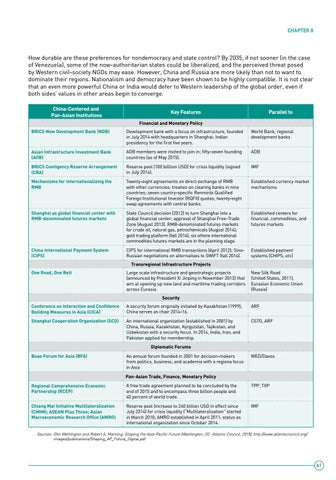CHAPTER 8
How durable are these preferences for nondemocracy and state control? By 2035, if not sooner (in the case of Venezuela), some of the now-authoritarian states could be liberalized, and the perceived threat posed by Western civil-society NGOs may ease. However, China and Russia are more likely than not to want to dominate their regions. Nationalism and democracy have been shown to be highly compatible. It is not clear that an even more powerful China or India would defer to Western leadership of the global order, even if both sides’ values in other areas begin to converge. China-Centered and Pan-Asian Institutions
Key Features
Parallel to
Financial and Monetary Policy BRICS New Development Bank (NDB)
Development bank with a focus on infrastructure, founded in July 2014 with headquarters in Shanghai; Indian presidency for the first five years.
World Bank, regional development banks
Asian Infrastructure Investment Bank (AIIB)
ADB members were invited to join in; fifty-seven founding countries (as of May 2015).
ADB
BRICS Contigency Reserve Arrangement (CRA)
Reserve pool (100 billlion USD) for crisis liquidity (signed in July 2014).
IMF
Mechanisms for internationalizing the RMB
Twenty-eight agreements on direct exchange of RMB with other currencies; treaties on clearing banks in nine countries; seven country-specific Renminbi Qualified Foreign Institutional Investor (RQFII) quotas; twenty-eight swap agreements with central banks.
Established currency market mechanisms
Shanghai as global financial center with RMB-denominated futures markets
State Council decision (2012) to turn Shanghai into a global financial center; approval of Shanghai Free-Trade Zone (August 2013). RMB-denominated futures markets for crude oil, natural gas, petrochemicals (August 2014); gold trading platform (fall 2014); six othere international commodities futures markets are in the planning stage.
Established centers for financial, commodities, and futures markets
China International Payment System (CIPS)
CIPS for international RMB transactions (April 2012); SinoRussian negotiations on alternatives to SWIFT (fall 2014).
Established payment systems (CHIPS, etc)
One Road, One Belt
Large scale infrastructure and geostrategic projects (announced by President Xi Jinping in November 2013) that aim at opening up new land and maritime trading corridors across Eurasia.
Conference on Interaction and Confidence Building Measures in Asia (CICA)
A security forum originally initiated by Kazakhstan (1999); China serves as chair 2014-16.
ARF
Shanghai Cooperation Organization (SCO)
An international organization (established in 2001) by China, Russia, Kazakhstan, Kyrgyzstan, Tajikistan, and Uzbekistan with a security focus. In 2014, India, Iran, and Pakistan applied for membership.
CSTO, ARF
Transregional Infrastructure Projects New Silk Road (United States, 2011), Eurasian Economic Union (Russia)
Security
Diplomatic Forums Boao Forum for Asia (BFA)
An annual forum founded in 2001 for decision-makers from politics, business, and academia with a regiona focus in Asia
WED/Davos
Pan-Asian Trade, Finance, Monetary Policy Regional Comprehensive Economic Partnership (RCEP)
A free trade agreement planned to be concluded by the end of 2015 and to encompass three billion people and 40 percent of world trade.
TPP, TIIP
Chiang Mai Initiative Multilateralization (CMIM); ASEAN Plus Three; Asian Macroeconomic Research Office (AMRO)
Reserve pool (increase to 240 billion USD in effect since July 2014) for crisis liquidity (“Multilateralization” started in March 2010; AMRO established in April 2011, status as international organization since October 2014.
IMF
Sources: Olin Wethington and Robert A. Manning, Shaping the Asia-Pacific Future (Washington, DC: Atlantic Council, 2015), http://www.atlanticcouncil.org/ images/publications/Shaping_AP_Future_Digital.pdf.
61
